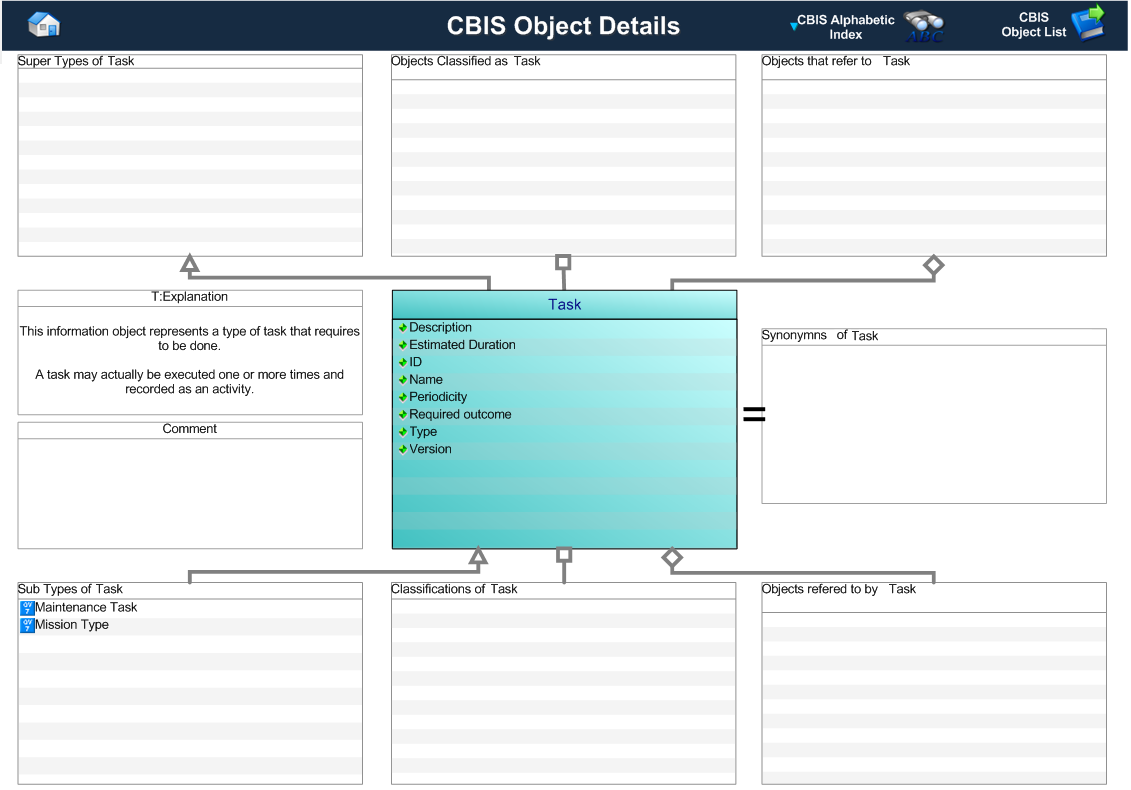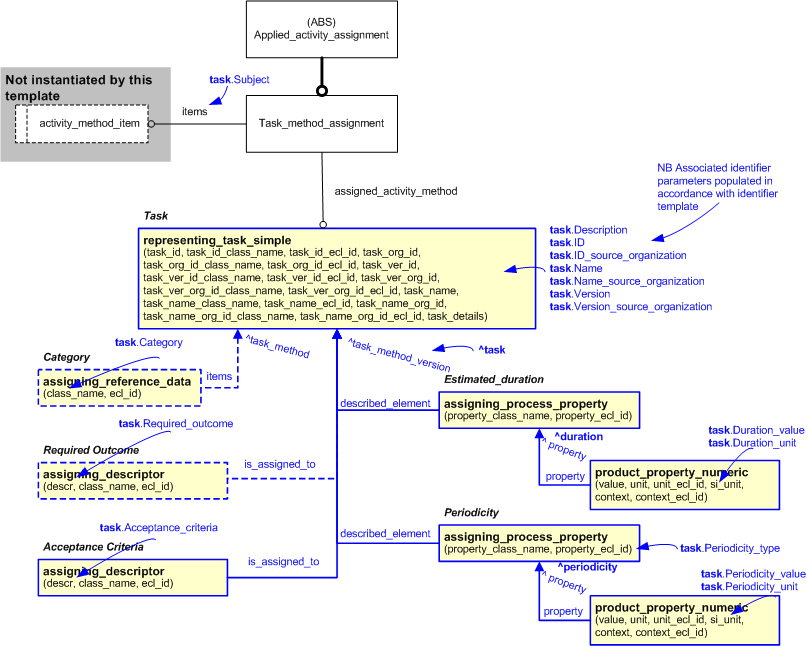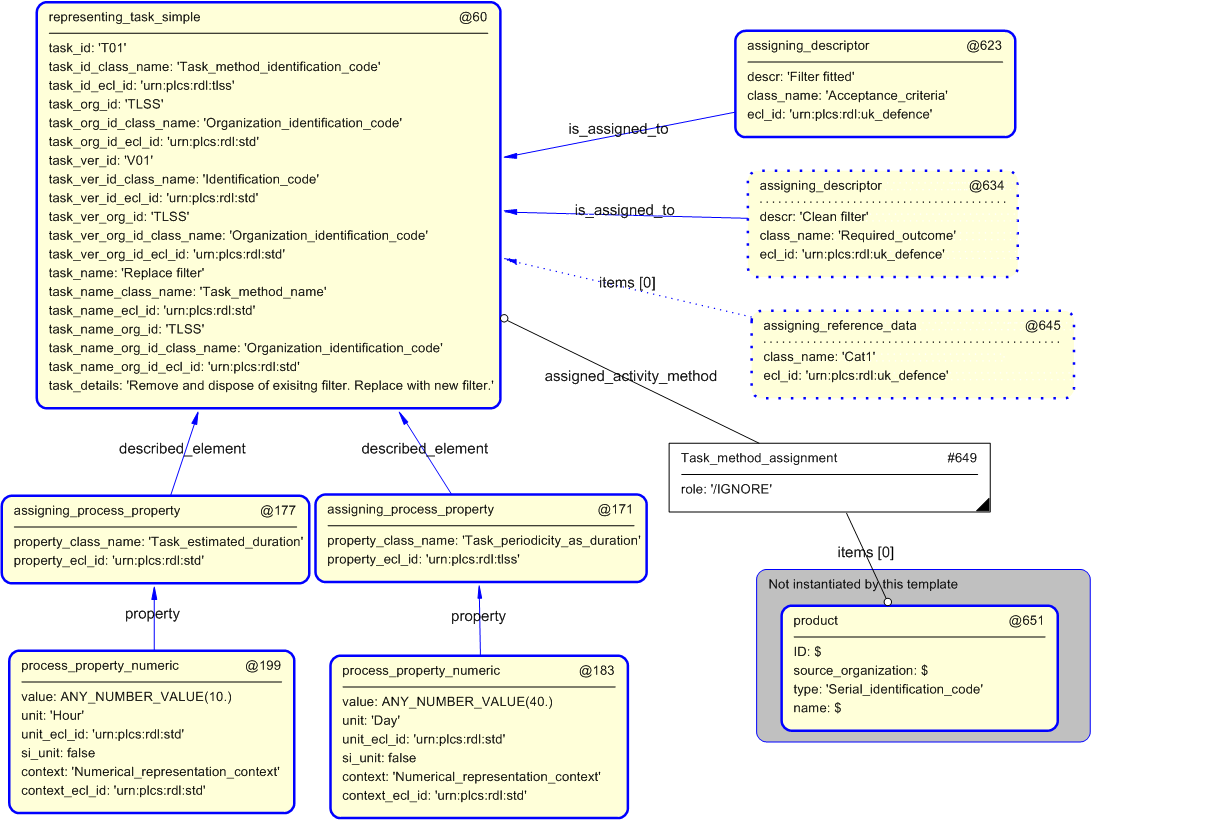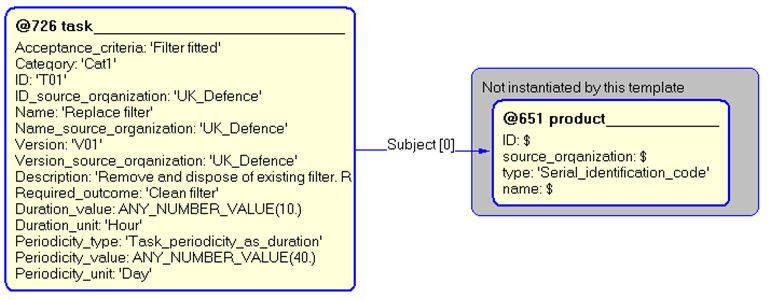Template:— task (tsk)
Context:— UK_Defence |
Date: 2009/10/07 21:01:51
Revision: 1.4
|
This section specifies the template task.
NOTE
The template has been defined in the context of
UK_Defence.
Refer to the business context for details of related templates.
NOTE
An explanation of a template and the associated instantiation path is
provided in the
Template overview
section.
This template describes how to represent a type of task that is required to be performed.
The Task business object is used by those UK_Defence Data Exchange
Specifications that require information about definitions of activities.
Figure 1 — Graphical Representation for Business Object Task
Task:
The definition of an Task object is:
Data about definitions of activities.
|
Attribute name
|
Attribute description
|
Attribute type
|
Optionality
|
| Acceptance criteria |
This is the acceptance criteria for the task |
Intrinsic |
Mandatory |
| Category |
This is the category of the task.
Examples from DEF STAN 00-60 [DED 427, part a, task function] and [DED 640, fitment code, element 1] include:
The categories include:
"access",
"adjust",
"align",
"calibration",
"camouflage",
"clean",
"condition monitoring",
"debug",
"disassemble assemble",
"dispose",
"end of runway inspection",
"evaluate",
"fault location",
"fit",
"function ",
"inspect",
"load unload",
"lubricate",
"mission profile change role change",
"operate",
"overhaul",
"package unpackage",
"preserve",
"preventive maintenance on items in store",
"process",
"reconditioning",
"remove ",
"replace",
"repair",
"servicing",
"setup",
"software modification",
"standard serviceability test",
"test",
"transport",
"transportation preparation",
"drilling reaming trimming".
|
Intrinsic |
Optional |
| Description |
This is the description of the Task.. |
Intrinsic |
Mandatory |
| Estimated Duration |
The duration of the task. |
Intrinsic |
Mandatory |
| ID |
This is the Identifier of the Task. |
Identifier |
Mandatory |
| Name |
This is the name of the Task. |
Intrinsic |
Mandatory |
| Periodicity |
The time or usage interval that determines when the Task should next be performed. |
Intrinsic |
Mandatory |
| Required Outcome |
This is the description of the required outcome of the task |
Intrinsic |
Optional |
| Subject |
This is the subject for which the task was developed and to which it applies. |
Relationship to Product Design, Fleet Component, Organization, Risk, Platform System Equipment,
Facility Type, Person Type
|
Mandatory |
| Version |
This is the version of the task |
Intrinsic |
Mandatory |
Table 1 — Task attribute details
The EXPRESS-G diagram in
Figure
2
shows the templates and EXPRESS entities that are required
to represent the template
"task".
The text highlighted in blue shows the template parameters.
Figure 2 — An EXPRESS-G representation of the Information model for task
The graphic for the template to be used in other EXPRESS-G diagrams
is shown in Figure
3
below.
Figure 3 — The graphical representation of the task template
The following input parameters are defined for this template:
This is the acceptance criteria for the task
This is the category of the task.
The following classes and their sub-classes can be used:
classifications: [Task_category]![[warning:]](../../../../../../images/dex/warning.gif) Error RDL4: The URI urn:plcs:rdl:uk_defence is not listed in dexlib/data/refdata/rdl_index.xml
Error RDL4: The URI urn:plcs:rdl:uk_defence is not listed in dexlib/data/refdata/rdl_index.xml
The identifier of the organization responsible for the task identifier.
The identifier of the organization responsible for the task name.
The identifier of the organization responsible for the task version.
The description of the task.
This is the description of the required outcome of the task
The duration of the task expressed as a number of the time units represented in the parameter @Duration_unit.
The time units in which the duration is expressed.
The following classes and their sub-classes can be used:
The indication of whether periodicity is measured as number of times used or as a number of time units.
The following classes and their sub-classes can be used:
classifications: [Task_periodicity_as_usage]![[warning:]](../../../../../../images/dex/warning.gif) Error RDL4: The URI urn:plcs:rdl:uk_defence is not listed in dexlib/data/refdata/rdl_index.xml[Task_periodicity_as_duration]
Error RDL4: The URI urn:plcs:rdl:uk_defence is not listed in dexlib/data/refdata/rdl_index.xml[Task_periodicity_as_duration]![[warning:]](../../../../../../images/dex/warning.gif) Error RDL4: The URI urn:plcs:rdl:uk_defence is not listed in dexlib/data/refdata/rdl_index.xml
Error RDL4: The URI urn:plcs:rdl:uk_defence is not listed in dexlib/data/refdata/rdl_index.xml
The time or usage interval that determines when the Task should next be performed expressed as a number of the time
units represented in the parameter @Periodicity_unit
(if the @Periodicity_type parameter is set to
[Task_periodicity_as_duration]![[warning:]](../../../../../../images/dex/warning.gif) Error RDL4: The URI urn:plcs:rdl:uk_defence is not listed in dexlib/data/refdata/rdl_index.xml
Error RDL4: The URI urn:plcs:rdl:uk_defence is not listed in dexlib/data/refdata/rdl_index.xml);
or, as a number of usages
(if the @Periodicity_type parameter is set to
[Task_periodicity_as_usage]![[warning:]](../../../../../../images/dex/warning.gif) Error RDL4: The URI urn:plcs:rdl:uk_defence is not listed in dexlib/data/refdata/rdl_index.xml
Error RDL4: The URI urn:plcs:rdl:uk_defence is not listed in dexlib/data/refdata/rdl_index.xml).
The time or duration units in which the time interval that determines when the Task should next be performed is
expressed; or the class
[Count]![[warning:]](../../../../../../images/dex/warning.gif) Error RDL1: The class Count does not exist in RDL at URI urn:plcs:rdl:std. Check the dexlib/data/refdata/rdl_index.xml
Error RDL1: The class Count does not exist in RDL at URI urn:plcs:rdl:std. Check the dexlib/data/refdata/rdl_index.xml
when the periodicity is expressed as a number of usages.
The following classes and their sub-classes can be used:
This is the subject for which the task was developed and to which it applies.
The following reference parameters are defined for this template:
Allow the
Task_method_version
entity instantiated in this path to be referenced when this template is used.
%^target = $task.task%
Allow the
Activity_property
entity instantiated in this path to be referenced when this template is used.
%^target = $task.duration%
The duration of the task.
Allow the
Activity_property
entity instantiated in this path to be referenced when this template is used.
%^target = $task.periodicity%
The periodicity of the task.
The following parameter combinations specify a uniqueness constraint:
Unique constraint: Unique task
The instantiation path shown below specifies the entities that are to be
instantiated by the template.
A description of templates and the syntax for the instantiation path is
provided in the
Templates Help/Information section.
-- Task /
representing_task_simple(
task_id=@ID,
task_id_class_name='Task_method_identification_code',
task_id_ecl_id='urn:plcs:rdl:uk_defence',
task_org_id=@ID_source_organization,
task_org_id_class_name='Organization_identification_code',
task_org_id_ecl_id='urn:plcs:rdl:std',
task_ver_id=@Version,
task_ver_id_class_name='Identification_code',
task_ver_id_ecl_id='urn:plcs:rdl:std',
task_ver_org_id=@Version_source_organization,
task_ver_org_id_class_name='Organization_identification_code',
task_ver_org_id_ecl_id='urn:plcs:rdl:std',
task_name=@Name,
task_name_class_name='Task_method_name',
task_name_ecl_id='urn:plcs:rdl:std',
task_name_org_id=@Name_source_organization,
task_name_org_id_class_name='Organization_identification_code',
task_name_org_id_ecl_id='urn:plcs:rdl:std',
task_details= @Description)/
-- Assign task reference parameter %^task = $representing_task_simple.task_method_version%
%^task_method = $representing_task_simple.task_method%
-- Acceptance criteria /
assigning_descriptor(
descr=@Acceptance_criteria,
class_name='Acceptance_criteria',
ecl_id='urn:plcs:rdl:uk_defence',
is_assigned_to=^task)/
-- [optional Required outcome] /
assigning_descriptor(
descr=@Required_outcome,
class_name='Required_outcome',
ecl_id='urn:plcs:rdl:uk_defence',
is_assigned_to=^task)/
-- [optional Category] /
assigning_reference_data(
items=^task_method,
class_name=@Category,
ecl_id='urn:plcs:rdl:uk_defence')/
-- Estimated_duration /
assigning_process_property(
property_class_name='Task_estimated_duration',
property_ecl_id='urn:plcs:rdl:uk_defence',
described_element=^task)/
-- Assign duration reference parameter %^duration = $assigning_process_property.property%
-- Estimated_duration value /
process_property_numeric(
value=@Duration_value,
unit=@Duration_unit,
unit_ecl_id='urn:plcs:rdl:std',
si_unit='false',
context='Numerical_representation_context',
context_ecl_id='urn:plcs:rdl:std',
property=^duration)/
-- Periodicity /
assigning_process_property(
property_class_name=@Periodicity_type,
property_ecl_id='urn:plcs:rdl:uk_defence',
described_element=^task)/
-- Assign periodicity reference parameter %^periodicity = $assigning_process_property.property%
-- Periodicity value /
product_property_numeric(
value=@Periodicity_value,
unit=@Periodicity_unit,
unit_ecl_id='urn:plcs:rdl:std',
si_unit='false',
context='Numerical_representation_context',
context_ecl_id='urn:plcs:rdl:std',
property=^periodicity)/
-- Subject Task_method_assignmentTask_method_assignment.assigned_activity_method ->
^task
Task_method_assignment.items ->
@Subject
The instance diagram in Figure
4
shows an example of the EXPRESS entities and templates that are instantiated by the template:
/task(Acceptance_criteria='Filter fitted', Category='Cat1', ID='T01', ID_source_organization='UK_Defence', Name='Replace filter', Name_source_organization='UK_Defence', Version='V01', Version_source_organization='UK_Defence', Description='Remove and dispose of existing filter. Replace with new filter.', Required_outcome='Clean filter', Duration_value='ANY_NUMBER_VALUE(10)', Duration_unit='Hour', Periodicity_type='Task_periodicity_as_duration', Periodicity_value='ANY_NUMBER_VALUE(40)', Periodicity_unit='Day', Subject='#142')/
(an illustration of the consolidated task template is shown in
Figure
5 below.)
Figure 4 — Entities instantiated by task template
The instance diagram in
Figure
5
shows the graphic symbol for the template that is to be
used in other instance diagrams. The example template is:
/task(Acceptance_criteria='Filter fitted', Category='Cat1', ID='T01', ID_source_organization='UK_Defence', Name='Replace filter', Name_source_organization='UK_Defence', Version='V01', Version_source_organization='UK_Defence', Description='Remove and dispose of existing filter. Replace with new filter.', Required_outcome='Clean filter', Duration_value='ANY_NUMBER_VALUE(10)', Duration_unit='Hour', Periodicity_type='Task_periodicity_as_duration', Periodicity_value='ANY_NUMBER_VALUE(40)', Periodicity_unit='Day', Subject='#142')/
Figure 5 — Instantiation of task template
Characterizations
No common characterizations of the template
task
have been identified. However, the ISO 10303-239 EXPRESS model
may enable other assignments to the entities instantiated by the template.




